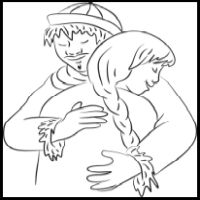- About Us
- Columns
- Letters
- Cartoons
- The Udder Limits
- Archives
- Ezy Reading Archive
- 2024 Cud Archives
- 2023 Cud Archives
- 2022 Cud Archives
- 2021 Cud Archives
- 2020 Cud Archives
- 2015-2019
- 2010-2014
- 2004-2009
 |
(Mar 2022) Do YOU need a hug, Ruby? |
Part 1:
A Hug from a Stranger
I was about to dress for work when I heard a rapid knocking on my door. We live at the end of a dead-end street without many passersby, but occasionally people show up and ignore my NO TRESPASSING signs.
The woman on my porch was a head shorter than me and half my weight, somewhere in her thirties. She was pretty, with brown hair, glasses, and a nice smile, and she lit up when she saw me. Normally, I’d not allow a stranger in, but she didn’t seem at all threatening.
“You have to close the outer porch door,” I told her. “I don't want my cats to get out.”
“Oh!” she cried, and quickly shut it. I noticed she was driving a large black Jeep that looked new and expensive, with nobody in it. I admitted her into my kitchen, where she stood barely a foot and half from me and looked into my eyes.
“What can I do for you?” I asked.
“Can I meet your wife?” she asked. “What's her name?”
Door-to-door Christians are the ones who usually ignore my signs, and that’s what this felt like. “Her name is Elaine. She's at work so you'll have to come back this evening.”
“That’s okay. How long have you lived here?”
“We bought this house in 2007.”
She nodded sagely, and I waited for the Bible tracts to come.
“I need to give you a hug,” she said.
That caught me completely off-guard. A lone woman doesn’t normally enter the house of a strange man twice her size and ask for a hug. If it were a ploy to show how God is with her, it was a dangerous gamble. Fortunately for her, I was sane. But was she? Her hands were empty; she seemed unarmed. This was a bizarre situation, but it was a mystery with a logical explanation. I’d solve it.
“Why?” I asked.
“Because you're a wonderful person,” she said without hesitation, her eyes still locked on mine. “You've helped so many people.”
I was already off-balance in this encounter, but this threw me further. I didn’t know this woman, but she clearly knew me—or at least knew of me.
“I'm sorry… what's your name?”
Again without hesitation, she answered: “Ruby Aster Davidson.” (Not her real name.) “Don't you know me?”
She looked at me expectantly, as if she were waiting for my “Aha!” moment and we’d have some kind of reunion. But I had no clue who she was.
“I'm sorry, I don't,” I said.
Perhaps there was the briefest moment of disappointment on her face, but she rebounded immediately. “That's okay,” she said with her stalwart confidence. “I need to give you a hug.”
And then she just stepped in and wrapped her arms around me. I don’t know why I let her. I froze, my hands jutting out behind her. I was afraid to participate. Who was she? Was this a setup of some kind? Or was it heading toward sexual? And if so, why? I was still betting on Bible tracts, but what if it were something more nefarious?
But her hug persisted, and she told me again that I was a wonderful person and I’d helped so many people. So I returned the hug, engaging with my hands on her back, and when I did she hugged me even tighter. This hug, from start to finish, went on for at least thirty seconds. That’s a long time for two strangers. My mind raced the whole time, trying to solve the mystery.
Strangely, though… I really enjoyed the hug. I shouldn’t have—this woman had to have some underhanded reason for all this. But it was a powerful and deeply moving experience, even if I don’t exactly know why.
And then she said again, in my ear: “You’re a wonderful person.”
This snapped me out of hug-appreciation mode. I broke the hug and stepped back, but she held her stance, again locking her eyes on mine.
“How do you know?” I said. “You don't know me. I could be a horrible person, for all you know.”
Without hesitation, she said, “No, you're not.” And her voice raised, ever so slightly, and her resolve momentarily became fervent passion. “Why do you think I drove here and marched right up to your door and knocked?”
I wanted to say, "Because I think you're crazy or you're about to thump me with a Bible,” but somehow I held back and said, “I don’t know.”
She shifted her weight back on one foot and placed a hand on one hip, and with a slight half-smile half-turned head she said, “What's the word?”
She said it like a challenge—as if there were a secret password that she expected me to say, but of course I was waiting for her sermon about the Word of God.
“I don't know.”
She smiled at me again. “That's okay.”
And just like that, she left my house. As I closed the door behind her, she turned and called back, “Take care of yourself! See a doctor!”
I retreated to my living room, mentally replaying the bizarre event. It occurred to me that I should have gotten her license-plate number, so I rushed to the bay window that overlooks the street and started video-recording. It took her a bit to get out of the driveway, and when she hit the street she took off at a good clip. I couldn’t get the plate.
I spoke to my wife, who was very concerned. Elaine questioned if the woman were a scammer canvassing houses—or maybe that she’d go to the police and claim that I did something to her. I didn’t expect either of these things, but I emailed the chief of police anyway, just in case.
Part 2:
Investigating the Mystery
I posted a very brief summary about this online and told my co-workers about it. Opinions abounded: She was a grifter. She was trying to pluck my hair for DNA. She was a psychic. She was crazy. She was a religious nut and this was just Phase One. She was my long-lost daughter I never knew I had. And so on.
I tried to find her on Facebook because my OCD was burning a hole in my brain. This woman clearly knew me—or knew of me, through someone. I was positive I’d never met her before. How did she know me? And what was it that made her come to my house and hug me?
A co-worker found her for me. It turns out I’d heard her last name wrong; it wasn’t Davidson but Davison. I’d been searching the Internet for people named Ruby Aster Davidson, but when my co-worker tried just “Ruby Davidson” she found a “Ruby Davison” on Facebook. And there she was in her profile photo, the woman who had turned my day upside-down, so I friend-requested her and then messaged her to say, “Hi, Ruby.”
From her profile, she didn’t seem harmless: married with kids, living in my nearby hometown, spiritual but not overtly religious (which surprised me). Whatever; she had done this bizarre thing to me, and I would have answers. I knew who she was, and soon knew her family, extended family, home address, age, maiden name, and more.
I redacted her name from my Facebook post, as there was no need for people to locate and bother her. Then, the next morning, when my friend request had gone unanswered, in an online chat I told my best friend the pile of information I’d learned.
“Now it’s my turn,” I said.
My friend laughed, and so did I. No, this woman couldn’t show up and unload this cryptic diatribe on me and not expect me to pursue answers! If that meant filing trespassing charges and taking her to court, I would. I needed answers. I needed to hear from her how she knew me.
But a few hours later, everything changed.
Her sister, “Jennifer,” sent me a Facebook message. I knew the name when it popped up because I had tracked down who her family was. But I wasn’t prepared for the long chat, which held many surprising revelations.
Ruby has bipolar disorder, and when another sister had been diagnosed with serious cancer, Ruby hadn’t taken it well. That morning, she’d taken off and was missing for some time. She’d made statements to her family that day leading them to be concerned for her safety, and it sounded like she’d been admitted for treatment.
Along with her disorder, Jennifer said that Ruby believes she’s a psychic medium. Jennifer insisted that Ruby had chosen me at random—she’d seen my house and stopped there in the middle of her break with reality. When Jennifer saw my Facebook post, she was stunned because Ruby had never done anything like this. And, she said, Ruby had no memory of visiting me.
Jennifer seemed to think I was in Ruby’s town, so I clarified to her that I was not, and that Ruby had to go out of her way to find my street, never mind drive to the dead end and up my driveway to find me. Did she know me through someone? Did she know me by name? Did she once know someone who had lived in my house? No, Jennifer said; it really was all just random.
I sent Jennifer the detailed transcript that I’d sent the police in case it helped in Ruby’s treatment. Jennifer was stunned by the details and thanked me profusely for… I don’t know, not being evil? She said Ruby was fortunate to have chosen my house, because—as I had wondered—what if she’d chosen the wrong one?
Jennifer had no answers except that Ruby was not well. I told her that I hoped Ruby would be, and to let me know if I could help in any way. I’d bide my time until Ruby was better and perhaps she’d reach out to me.
Part 3:
Self-Revelation
I left work to meet my wife for dinner. In that 15-minute drive, all I could think about was how I’d been so wrong about Ruby.
From the moment she’d entered my house, she’d been a mysterious challenge to be conquered. I was sure that she was a door-to-door proselytizer. I was so confident in my intellectual and moral superiority that I knew I’d trip her up. I was waiting for the Chick tracts, the Bible, the claim that Jesus saves, and her concern about my immortal soul.
I’d considered that she was nuts—but perhaps only in the way that any atheist thinks door-to-door proselytizers are nuts. I was more interested in the psychological chess game than her mental health. I tried to trip her up, but she was confident and forceful and in charge and I was frustrated at being kept off-balance. All the while, I was waiting for the big religious reveal, so that I could chastise her for trespassing and let her know that I was an atheist who wasn’t interested in what she was selling.
I know that I had no way of knowing her particular situation. She wasn’t crying or nervous. She maintained eye contact. She wasn’t trembling when she hugged me. I could feel her heartbeat against my body, and it wasn’t racing. She was calm, fearless, confident, and strong. Yet my suspicions persisted. Weren’t my assumptions in the face of this bizarre situation totally reasonable under the circumstances?
No—I knew she wasn’t right. I ignored it in favor of the mystery to be solved.
By the time I met Elaine, I’d had quite a look at myself, and it wasn’t a positive look. I told Elaine how I’d realized that Ruby had been in crisis and I’d been too blinded by my own arrogance to see it. I told her that it was forcing me to re-examine myself. I couldn’t stop myself from crying in the restaurant. Elaine probably thought I’d lost my mind.
I tried to explain this to Jennifer the next day and apologize for how I’d handled things. I’d failed her sister, but Jennifer didn’t agree. She was just happy that her sister didn’t knock on the door of some maniac. But I’d been surprised that morning when I’d discovered that Ruby had blocked me on Facebook.
Jennifer explained that she had blocked me because her sister had a good support system; clearly, any communication from me to Ruby was unwelcome. Jennifer told me not to take it personally, and again lavished me with praise about how great I was. Then she decreed that God had guided Ruby to me—and, if I wanted to help Ruby, the best way was to pray for her.
I told her that I could not pray for Ruby because I was an atheist, so instead I would hope that she would be all right. It certainly should make a religious person question why God had guided Ruby past hundreds of Christian households to an atheist’s home. And it definitely left me wondering even more just why Ruby showed up that day.
Part 4:
What Is the Frequency?
I keep thinking about the guy who assaulted Dan Rather, repeatedly asking him, “Kenneth, what is the frequency?” People thought Rather made it up, but it turns out that guy was not in his right mind, which anyone could surmise.
Ruby was in a similar state. I should have set aside my obsession with winning the game and helped her. Telling a strange man in his home that you needed to hug him because he’s a wonderful person is tantamount to screaming “Kenneth, what is the frequency?”
I owe Ruby Aster Davison an apology for everything that I might have seen but didn't. I owe HER a hug. I owe myself a kick in my own ass. When I think of telling everyone this bizarre story, and listening to everyone's theories and private messages and so forth, I’m stunned. Was she a Bible nut? Lunatic? Grifter? Blackmailer? Was she just evil? Doing some lame Tik Tok challenge? Looking for sex? Did she know me and I just had to remember our forgotten connection? And so many other outlandish possibilities—always sure that she knew me somehow. I was full of Vulcan logic, convinced of how right I was. I never even considered that she was in crisis.
Everyone who knows me has tried to console me and tell me that there was no way I could have known. Even The Cud’s editor thinks I’m being too hard on myself. Everyone has echoed what a good person I am. They’ve said everything that people say to make you feel better.
They’re all kind, but they weren’t there, and can’t see this from my perspective. I DID know that something was wrong. I knew that Ruby wasn’t right or crazy or weird or something like that. I knew that no woman in her right mind would randomly go to a strange man’s house to hug him—without nervousness, trembling, or hesitation. Worse yet, I’d thought of her potential mental-health issue as a joke. When she asked, “Why do you think I drove here and marched right up to your door and knocked?” my first instinct was to say “Because I think you're crazy or you're about to thump me with a Bible.” I didn’t, but that’s where my mind went.
This was not something a normal person in a safe mental state does. All I needed to do was ask her something—anything—that mattered.
Are you all right?
Are you in crisis?
Is there something you need to talk about?
Is there someone I can call?
Do you need help?
Do YOU need a hug, Ruby?
Ruby Aster Davison, whatever her mental state, gave me a deeply moving experience. In return, I failed her. And I failed myself as a decent human being. To make matters worse, I’m obsessive-compulsive and I cannot let go of this. I cannot go the rest of my life with this unsolved mystery eating away at my brain like an itch I can’t scratch. I must have closure. I must solve things. I must have answers. Even if Ruby tells me “I don’t even remember it happening so I cannot tell you anything except that I don’t know you and had never been to your house before,” that will be enough. But just the chance that she could say “I do remember it now, and…” Maybe she believed God guided her. Maybe she thinks the spirits directed her there. Maybe she had been there before, years ago. Maybe she does know of me somehow. Maybe, maybe, maybe… and not knowing will tear my mind apart. Maybe that’s the punishment for my failure.
The family has barred me from talking to her, as if perhaps I’ve done something wrong. That’s fair; they don’t know me, and they’re concerned for her dignity when she learns about this. But I don’t know how I’ll get through this—not knowing why, and not knowing how to think of myself as anything but a substandard human being should have done something—anything—other than what I did. There are always options beyond snap judgments and thoughts of ridicule. Maybe there was nothing at all that I could have done that would have made a difference, but at least then I would know that I tried.
Socrates said that the unexamined life is not worth living. Having been examining mine, I cannot help but question whether this life is worth living. That doesn’t mean I’m ready to stick a gun in my mouth; it just means that I need to change myself as a person if I’m to do better.
But I’ll always remember when I did it all wrong. I’m just happy that Ruby didn’t leave my house and find her fate at another house, because she certainly could have.
I’m sorry, Ruby. And I’m ashamed.
* * *
If you or someone you know is in crisis, call the emergency number wherever you are:
https://en.wikipedia.org/wiki/List_of_emergency_telephone_numbers
David M. Fitzpatrick is a fiction writer in Maine, USA. His many short stories have appeared in print magazines and anthologies around the world. He writes for a newspaper, writes fiction, edits anthologies, and teaches creative writing. Visit him at www.fitz42.net/writer to learn more.
